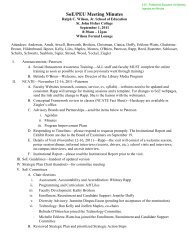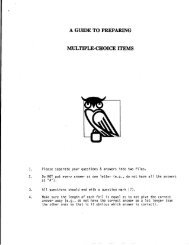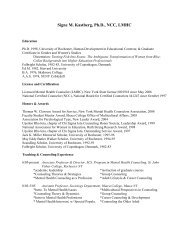- Page 1 and 2:
Arndt, Katrina Publications Arndt,
- Page 3 and 4:
engagement with the print texts, st
- Page 5 and 6:
Wood (1989) asserts that films ofte
- Page 7 and 8:
Set in Cincinnati, The Mighty is th
- Page 9 and 10:
It is clear that Kevin's genetic di
- Page 11 and 12:
their friendships with Max and Joe,
- Page 13 and 14:
offices in Chicago in 2007, or use
- Page 15 and 16:
Fine, Michelle. 1997. "Witnessing w
- Page 17 and 18:
“I’m So Excited About This!”
- Page 19 and 20:
with their nondisabled peers in an
- Page 21 and 22:
References About Hilton Schools. (n
- Page 23 and 24:
adequate services to this populatio
- Page 25 and 26:
I’m trying to accept it. I have u
- Page 27 and 28:
Table 1. Recommendations for Servic
- Page 29 and 30:
Nelson, B. (2005). Creating positiv
- Page 31 and 32:
Broikou, Kathy Presentations Decemb
- Page 33 and 34:
There are no samples of scholarly a
- Page 35:
Planting the seeds of partnership:
- Page 54 and 55:
Duets and Dialogue: Voices on Inclu
- Page 56 and 57:
Dedication For all the children, yo
- Page 58 and 59:
Acknowledgements The Editors would
- Page 60 and 61:
Introduction Duets and Dialogue: Th
- Page 62 and 63:
Duets and Dialogue: Voices on Inclu
- Page 64 and 65:
A Principal’s Lessons Learned: Im
- Page 66 and 67:
Collaborative relationships between
- Page 68 and 69: and it was fine and they were accep
- Page 70 and 71: A Principal’s Lessons Learned: Im
- Page 72 and 73: “I’m So Excited About This!”
- Page 74 and 75: with their nondisabled peers in an
- Page 76 and 77: References About Hilton Schools. (n
- Page 78 and 79: Are We There Yet? Making Inclusive
- Page 80 and 81: Know the number of students receivi
- Page 82 and 83: Multi-faceted Collaboration The thi
- Page 84 and 85: Roles and Responsibilities When emb
- Page 86 and 87: Are We There Yet? Making Inclusive
- Page 88 and 89: A Commitment to Change: One Distric
- Page 90 and 91: volunteerism on the part of the co-
- Page 92 and 93: contained classrooms to receive add
- Page 94 and 95: Reading 5: Looking Backward, Lookin
- Page 96 and 97: One School and One Principal’s St
- Page 98 and 99: CT and ICT class enrollments two st
- Page 100 and 101: It is essential that the building a
- Page 102 and 103: Looking Backward, Looking Forward:
- Page 104 and 105: Listening First: Designing and Impl
- Page 106 and 107: Restructuring For Inclusion The vis
- Page 108 and 109: eformatted from honors classes to a
- Page 110 and 111: Pedroza, A., Mullen, G., & Whiley,
- Page 112 and 113: Reading 7: An Administrator’s Vie
- Page 114 and 115: We might have seen the trouble comi
- Page 116 and 117: they could not and became lessons t
- Page 120 and 121: understanding. Perhaps one can sum
- Page 122 and 123: An Administrator’s View of Inclus
- Page 124 and 125: Billy’s Story: The Power of Colla
- Page 126 and 127: information, and helping to set up
- Page 128 and 129: meeting time can be established so
- Page 130 and 131: through his daily Home/School Commu
- Page 132 and 133: Billy’s Story: The Power of Colla
- Page 134 and 135: Creating and Sustaining Partnership
- Page 136 and 137: effort to support children who stru
- Page 138 and 139: This long term commitment also assi
- Page 140 and 141: and how we are grounded in research
- Page 142 and 143: Reading 10: Exploring Disability in
- Page 144 and 145: oader conversation about diversity
- Page 146 and 147: Expectations for student learning w
- Page 148 and 149: misfortune and less worthy lives (f
- Page 150 and 151: perception of disability, disabilit
- Page 152 and 153: REFERENCES Adler, M. and Rougle, E.
- Page 154 and 155: Exploring Disability in Young Adult
- Page 156 and 157: Julie Buick, The Advocacy Center Gi
- Page 158 and 159: Currier, Ed Presentations “Proble
- Page 160 and 161: Dingus-Eason, Jeannine Presentation
- Page 162 and 163: Your Child is Supposed to Behave Li
- Page 164 and 165: Desperately seeking equlibrium Eff
- Page 166 and 167: QuickTime and a decompressor are ne
- Page 168 and 169:
QuickTime and a decompressor are ne
- Page 170 and 171:
Assimilation Latitude of acceptance
- Page 172 and 173:
Patterns in development Birth- 2 y
- Page 174 and 175:
7-11 years (Concrete Operations) B
- Page 176 and 177:
Questions for yourself What need i
- Page 178 and 179:
Epistemology and diversity and soci
- Page 180 and 181:
ontolologies, or the nature of trut
- Page 182 and 183:
Ladson-Billings (1995), Gordon (199
- Page 184 and 185:
Denzin (year) cautions against acti
- Page 186 and 187:
evealing this process, we can then
- Page 188 and 189:
knowledge because it has become nor
- Page 190 and 191:
through connected ways of knowing a
- Page 192 and 193:
ehaviors can be attributed to our d
- Page 194 and 195:
To explore the possibility that we
- Page 196 and 197:
this chapter, repeating questions w
- Page 198 and 199:
cultural and to teach that any “n
- Page 200 and 201:
community resources and agencies th
- Page 202 and 203:
predicts states of understanding an
- Page 204 and 205:
and necessary concept to explore. A
- Page 206 and 207:
Gladstone-Brown, Wendy Presentation
- Page 208 and 209:
Marie Cianca, Ed. D. Michael Wischn
- Page 210 and 211:
The Importance of Parent- Teacher C
- Page 212 and 213:
Parent-Teacher Collaboration in Pre
- Page 214 and 215:
Origins of St. John Fisher Collabor
- Page 216 and 217:
How we made It happen… Focus grou
- Page 218 and 219:
COURSE ELEMENTS Teams and Teamwork
- Page 220 and 221:
Co-Teaching by Example: An Investig
- Page 222 and 223:
Co-Teaching by Example Main Themes
- Page 224 and 225:
Teacher Candidate Comments ( Before
- Page 226 and 227:
Teacher Candidates Initiate a Face-
- Page 228 and 229:
Teacher Candidate Teams identify a
- Page 230 and 231:
Teams Co-Present to Families(contin
- Page 232 and 233:
Teacher Candidate Comments ( After)
- Page 234 and 235:
“We learned understanding and emp
- Page 236 and 237:
Questions, Comments, Ideas… Micha
- Page 253 and 254:
Reading 4: A Commitment to Change:
- Page 255 and 256:
eaking the social barriers between
- Page 257 and 258:
For this restructuring to occur, Dr
- Page 259 and 260:
Scruggs, R.E., Mastropieri, M.A., &
- Page 278:
Kelly, Daniel Publications Cianca,
- Page 296 and 297:
Preservice Teachers' Perceptions of
- Page 298 and 299:
Llewellyn, Doug Publications Llewel
- Page 300 and 301:
FIGURE 1 Explanations What is the s
- Page 302 and 303:
as students struggle with the task
- Page 304 and 305:
an introductory soil lesson, I aske
- Page 306 and 307:
Maples, Joellen Publications Groenk
- Page 308 and 309:
Reproduced with permission of the c
- Page 310 and 311:
Reproduced with permission of the c
- Page 312 and 313:
Reproduced with permission of the c
- Page 314 and 315:
Paterson, Wendy Publications Paters
- Page 316 and 317:
The First Friday Faculty Lecture Se
- Page 318 and 319:
Rapp, Whitney Publications Rapp, W.
- Page 320 and 321:
Avoiding Math Taboos: Effective Mat
- Page 322 and 323:
Auditory Sequential Learners • Ar
- Page 324 and 325:
6 2002). This takes additional proc
- Page 326 and 327:
He thrived and added words like pen
- Page 328 and 329:
Offer opportunities to do math on t
- Page 330 and 331:
References Building big: Shapes lab
- Page 332:
Reed, D. (2010, September). Resilie
- Page 335 and 336:
Agenda 8:00 8:45 - 8:30 - 9:30 Intr
- Page 337 and 338:
Provide a framework for thinking ab
- Page 339 and 340:
Write 3 things that you think you k
- Page 341:
Book provides leaders with concrete
- Page 345 and 346:
Reflects a pattern of how individua
- Page 347 and 348:
Resilience is a long-term, not a sh
- Page 349 and 350:
Waterloo Community Adminstrators Su
- Page 351 and 352:
Having top-notch educational progra
- Page 353 and 354:
Core Values 21
- Page 355 and 356:
Alignment Taught Say Written Tested
- Page 357 and 358:
Lunch 25
- Page 359 and 360:
The major goals of this project wer
- Page 361 and 362:
You took the Survey and Got Your In
- Page 363:
Thinking Skills Understanding reali
- Page 367 and 368:
Reflective Questions for Resilience
- Page 369 and 370:
Reflective Questions for Resilience
- Page 371 and 372:
Reflective Questions for Resilience
- Page 373 and 374:
Resilient Leaders: Try to offset a
- Page 375 and 376:
Think about this past year when the
- Page 377 and 378:
5. How can you reduce your defensiv
- Page 379 and 380:
How do you maintain a work / life b
- Page 381 and 382:
Standards For Healthy Living 49
- Page 383 and 384:
Video “What’s Right With The Wo
- Page 385 and 386:
“Become a Resilient Front Runner
- Page 389 and 390:
Definition of Resilience Reflects a
- Page 391 and 392:
Definition of a Resilient Leader A
- Page 393 and 394:
Assumptions About Leadership Resili
- Page 395 and 396:
Leader Resilience Profile The major
- Page 398 and 399:
Leadership Resilience Profile Resul
- Page 400 and 401:
Book Title: Resilient Leadership fo
- Page 402 and 403:
Strength: Personal Efficacy Chapter
- Page 404 and 405:
Reflective Table Discussion Activit
- Page 406 and 407:
How Leaders Sustain and Strengthen
- Page 408 and 409:
Questions / Answers
- Page 411 and 412:
Warren Bennis American Psychologist
- Page 413 and 414:
A resilient leader demonstrates the
- Page 415 and 416:
The term “resilient leader” is
- Page 417 and 418:
The major goals of this project wer
- Page 419 and 420:
You took the Survey and Got Your In
- Page 421 and 422:
Instructions: For each of the seven
- Page 423 and 424:
Strengths Analysis 14
- Page 426 and 427:
PASA & Westmoreland IU 7 Superinten
- Page 428 and 429:
Moving forward to meet challenges o
- Page 430 and 431:
Authors Dr. Diane Reed Dr. Jerry Pa
- Page 434:
Thinking Skills Understanding reali
- Page 438 and 439:
How Can I: Extend my leadership ab
- Page 440 and 441:
How Can I: Protect the necessary t
- Page 442 and 443:
How Can I: Stay focused on what ma
- Page 447 and 448:
Chapter Six Resilience: Courage, Pe
- Page 449 and 450:
September 4 3 words that all essent
- Page 451 and 452:
September 4 5 ministers of educatio
- Page 453 and 454:
September 4 7 she and her husband a
- Page 455 and 456:
September 4 9 and minorities need a
- Page 457 and 458:
September 4 11 superintendents poss
- Page 459 and 460:
September 4 13 Panpim Cheaupalakit
- Page 461 and 462:
September 4 15 her male classmates.
- Page 463 and 464:
September 4 17 she was promoted to
- Page 465 and 466:
idging the gender gap.” In closin
- Page 467 and 468:
September 4 21 have fought for the
- Page 469 and 470:
tenaciously pursued the right to be
- Page 471 and 472:
September 4 25 The first coup in Gh
- Page 473 and 474:
September 4 27 educational trips fo
- Page 475 and 476:
September 4 29 underrepresentation
- Page 477 and 478:
asking me to come home. (J. W. T.,
- Page 479 and 480:
essence, or resilience” (317). Se
- Page 481 and 482:
September 4 35 are born with or can
- Page 483 and 484:
References September 4 37 Baldwin,
- Page 485 and 486:
[0011- 3921(200305/07)51:3/4;329-34
- Page 487 and 488:
GUEST EDITORIAL On Self-Revelation
- Page 489 and 490:
BERNARD RICCA recognize the persona
- Page 491 and 492:
Rostetter, Dave Presentations Kelly
- Page 493 and 494:
Schlosser, Linda Presentations Schl
- Page 495 and 496:
Schultz, Susan Publications Schultz
- Page 497 and 498:
Placement or college level classes.
- Page 499 and 500:
A Principal’s Lessons Learned: Im
- Page 501 and 502:
Collaborative relationships between
- Page 503 and 504:
and it was fine and they were accep
- Page 505 and 506:
A Principal’s Lessons Learned: Im
- Page 507 and 508:
There are no samples of scholarly a
- Page 509 and 510:
There are no samples of scholarly a
- Page 527 and 528:
Wood, Jim Publications Epistemology
- Page 529 and 530:
Implications: Fundamental Education
- Page 531 and 532:
I. Introduction: Honduras 4
- Page 533 and 534:
II. World Educational Models Human
- Page 535 and 536:
II. World Educational Models Religi
- Page 537 and 538:
II. World Educational Models Millen
- Page 539 and 540:
III. Education in Honduras “ . .
- Page 541 and 542:
III. Education in Honduras Reasons
- Page 543 and 544:
Implications: Fundamental Education
- Page 545 and 546:
IV. Evolution of Research Leading u
- Page 547 and 548:
IV. Evolution of Research Study Ove
- Page 549 and 550:
IV. Evolution of Research 45% 40% 3
- Page 551 and 552:
IV. Evolution of Research Education
- Page 553 and 554:
V. Methodology: Phase 1 Understandi
- Page 555 and 556:
V. Methodology: Phase 2 Educational
- Page 557 and 558:
V. Findings: Resilience Study PROTE
- Page 559 and 560:
VI. Implications and Recommendation
- Page 561 and 562:
Educational Risk and Resilience in
- Page 563 and 564:
References: Educational Resilience
- Page 565 and 566:
References: Educational Resilience
- Page 567 and 568:
Appendix 40
- Page 569 and 570:
100 90 80 70 60 50 40 30 20 10 0 Ap
- Page 571 and 572:
Hutchinson, E. (Ed.). (2010). Dimen
- Page 573 and 574:
what supports resilience? KEY IDEAS
- Page 575 and 576:
James are proud of Anthony’s wiry
- Page 577 and 578:
shy and withdrawn. Deborah remember
- Page 579 and 580:
Mexican specialty food staples to t
- Page 581 and 582:
must balance their economic product
- Page 583 and 584:
Despite the geographical distances
- Page 585 and 586:
States, health issues such as asthm
- Page 587 and 588:
Non- Hispanic White Girls Boys Non-
- Page 589 and 590:
population as a whole. A recent exa
- Page 591 and 592:
environments. For example, children
- Page 593 and 594:
possibly, learning styles. This int
- Page 595 and 596:
some areas, however, these developm
- Page 597 and 598:
apidly in the cognitive and moral d
- Page 599 and 600:
or multiple aspects of identity but
- Page 601 and 602:
system can provide support by being
- Page 603 and 604:
• Ability to mentally organize an
- Page 605 and 606:
Social Development Perhaps the most
- Page 607 and 608:
identity between feelings of power
- Page 609 and 610:
Swearer, 2003; Plaford, 2006). In r
- Page 611 and 612:
children’s dominance hierarchies
- Page 613 and 614:
perspectives. In turn, their capaci
- Page 615 and 616:
2003; Serbin, Powlishta, & Gulko, 1
- Page 617 and 618:
throughout childhood. In general, d
- Page 619 and 620:
spiritual development (Fowler & Del
- Page 621 and 622:
Although educational participation
- Page 623 and 624:
childhood. Formal Schooling and Cog
- Page 625 and 626:
students. Meanwhile, Anthony simult
- Page 627 and 628:
Health & Human Services, 2000). It
- Page 629 and 630:
in some way by school personnel (Co
- Page 631 and 632:
curricula challenging enough to fac
- Page 633 and 634:
(Kozol, 2005; Oakes, 1985; Oakes &
- Page 635 and 636:
Child Left Behind Education Act of
- Page 637 and 638:
Bureau data, in 2002, 69% of childr
- Page 639 and 640:
increased again during the early ye
- Page 641 and 642:
Over 6 years 37% 18,153,810 Over 6
- Page 643 and 644:
children? Witnessing violence deepl
- Page 645 and 646:
published a helpful overview of chi
- Page 647 and 648:
possessing a range of physical and
- Page 649 and 650:
• Often has difficulty sustaining
- Page 651 and 652:
(c) a lack of spontaneous seeking t
- Page 653 and 654:
independence (Goldstein, Kaczmarek,
- Page 655 and 656:
Children’s adjustment to special
- Page 657 and 658:
Family Disruption Throughout histor
- Page 659 and 660:
permanent plan (Downs, Moore, McFad
- Page 661 and 662:
eview of the literature and directi
- Page 663 and 664:
Littky, D. and Grabelle, S. (2004)
- Page 665 and 666:
human activity,” which is in-and-
- Page 667 and 668:
supremacy. The guiding principles a
- Page 669 and 670:
the need for teacher candidates to
- Page 671 and 672:
Is there any way for those of us wh
- Page 673 and 674:
1. Grounding each candidate in thei
- Page 675 and 676:
to examine their own perceptions, b
- Page 677 and 678:
Master of Science candidates are no
- Page 679 and 680:
our candidates do not already have
- Page 681 and 682:
Popkewitz & L. Fendler (Eds.) Criti


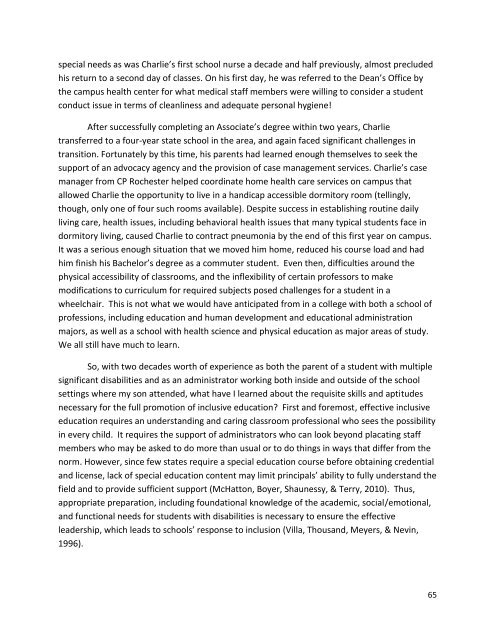
![Awards Program [pdf] - St. John Fisher College](https://img.yumpu.com/17224280/1/190x245/awards-program-pdf-st-john-fisher-college.jpg?quality=85)
![APPE Manual [pdf] - St. John Fisher College](https://img.yumpu.com/11492180/1/190x245/appe-manual-pdf-st-john-fisher-college.jpg?quality=85)
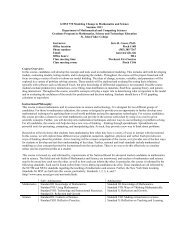
![Math Competency Ticket to Test [pdf] - St. John Fisher College](https://img.yumpu.com/10206520/1/190x245/math-competency-ticket-to-test-pdf-st-john-fisher-college.jpg?quality=85)
